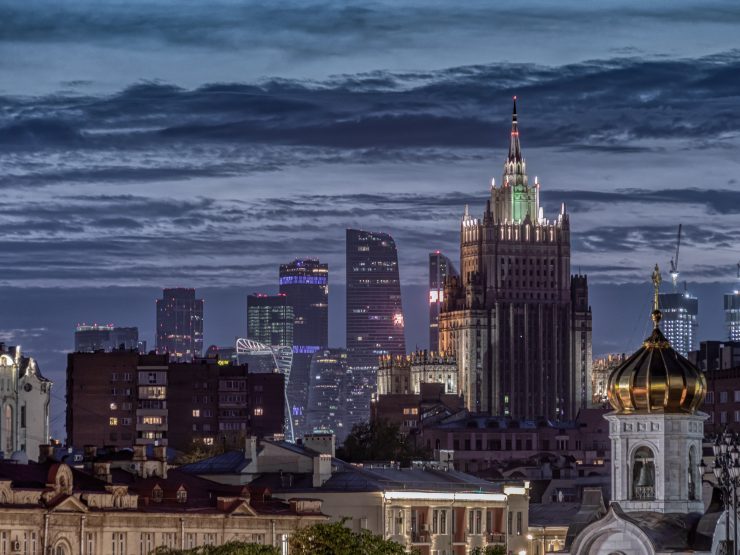SANCTIONS UNLEASHED
U.S. imposed sanctions against Russian Direct Investment Fund (RDIF), a sovereign wealth fund, and its CEO Kirill Dmitriev. The fund was set up to invest in promising Russian startups. In recent years, it has also promoted the use of the Russian COVID-19 vaccine abroad. [Source: RBC]
Japan, the U.S. and European Union move to cut off Russia from SWIFT financial network, in addition to other financial sanctions on Russian officials. The EU also said it plans to block half of the Russian central bank’s reserves. Even Switzerland is considering adopting European sanctions. [Source: WSJ, RBC, Reuters]
Google, YouTube, Twitter and Facebook blocked Russian state media companies from selling ads on their platforms. [Source: Axios]
MIT breaks off ties with Skolkovo Institute of Science and Technology, citing Russia’s military action in Ukraine. Skolkovo told The Boston Globe that it has nine projects with MIT and is “in close contact” with their colleagues. [Source: Associated Press]
UKRAINE
126 startups with primary offices or secondary operations in Ukraine have launched emergency plans to help their employees by offering financial assistance, evacuating to other countries or transferring operations outside the country. These startups include unicorn Grammarly and software development platform Github. [Source: Fortune]
Uber ceased operations in Ukraine after Russia invaded the country on February 24. The company told the media it had to stop its mobile app in a few cities due to rising geopolitical tensions, citing concerns over the security of passengers and drivers. Uber added it hoped to resume operations after the situation has settled down.[Source: Interfax]
Bulgaria’s tech community is mobilizing to help their counterparts in Ukraine, says Managing Partner of Launchlabs Sofia, a Bulgaria-based business redesign studio, in a LinkedIn post. Ellie Zheleva turned to Ukrainians through social media to offer assistance in getting to Bulgaria and help with accommodation in the country. [Source: LinkedIn]
FINTECH
Former deputy CEO of Sovkombank Kirill Sokolov acquired Vita bank to turn it into a fintech startup. The new company will use Best2Pay, an online payment processing platform for e-commerce, purchased by Sovkombank in 2021 for $45 million. Sovkombank will be one of the shareholders of the startup. But Sokolov noted that other investors, including Sovkombank’s competitors, can become shareholders. The profile of the startup has not been revealed. [Source: Interfax]
SOCIAL MEDIA
VK, a Russian social network, added a new function to its mobile app. It is able now to warn the user about spam, fraud, or suspicious incoming phone calls. For identification of a call, VK uses its phone database that’s formed by users’ reviews and analysis of spam and fraud activity gained from other sources. If an algorithm trained by machine learning finds a call inappropriate or suspicious, the user sees a warning and the name of the company the phone number belongs to. [Source: Searchengines.guru]
Telegram founder Pavel Durov announced potential limitation of Telegram channels sharing Ukraine conflict content to prevent the spread of misinformation, then changed his mind in response to user pushback. [Source: Telegram]
MARKET REPORT
Russian regional authorities increased expenses for drones by 84% in 2021 versus 2020, totaling nearly $5.7 million. Unmanned aerial vehicles are primarily used for environment monitoring and construction. In the future, they can be used for creating digital models of buildings. Drones made in Russia now hold an 80% market share. [Source: Kommersant]
PUBG Mobile, YouTube, and TikTok are the most popular mobile apps measured by daily spent time among Russian consumers older than 12, the consulting company Mediascope revealed. PUBG is the leader with an average time of 91 minutes a day. It is followed by YouTube for Children with 85 minutes. YouTube took the third position with 82 minutes leaving TikTok fourth with 81 minutes. Others in the top ten are TikTok Lite, Empires & Puzzles, World of Tanks Blitz, Standoff 2, and Fishdom: Deep Dive. [Source: Forbes]
RETAIL
Russia’s biggest bank Sber is in talks with a retail company X5 Group to purchase Vprok.ru Perekrestok, an online part of the offline retail chain Perekrestok, for an undisclosed sum. Vprok.ru Perekrestok will reportedly become part of Sbermegamarket, Sber’s e-commerce unit. The parties are negotiating a wide cooperation in the digital field to join efforts in e-commerce, cloud computing, artificial intelligence, data architecture management, and other areas. [Sources: Forbes, Spark]
Wildberries, the biggest Russian online marketplace, started operations in Uzbekistan to add the 33-million nation to its 20 international markets, including Germany, France, and Great Britain. 13 of the markets were opened during 2020-2021. Last years’ sales outside Russia totaled $419 million with the revenue from all sales being $10 billion, up 93% compared to 2020. The number of goods bought through Wildberries exceeded one billion last year, 81% more than in 2020. [Source: Kommersant]
Amid the Ukrainian crisis, Ozon and Yandex.Market, Russia’s leading online marketplaces, announced steps to support vendors selling goods through their platforms. Ozon said there will be intermediate payments to the vendors and ease of delivery requirements. Besides that, the vendors can use Ozon’s storage facilities for free through June 30. Yandex.Market will be doing daily payments through March 7, the period can be extended if necessary. The vendors are also allowed to sell goods with full prepayments, a move aimed at reducing the number of cancellations by customers. [Sources: Rusbase]
RELOCATION
Russian relocation service providers Relocode and Tagler Harbor said requests for relocation from Russian startups and IT companies to European countries increased by more than 10 times in February. The reason is often a requirement from major European clients who don’t like their suppliers to be in a politically unstable country, which Russia has been turning into for the last several months. The most popular countries as a new place for a headquarters are Great Britain, Ireland, Spain, Portugal and France. [Source: VC.ru]






Add comment